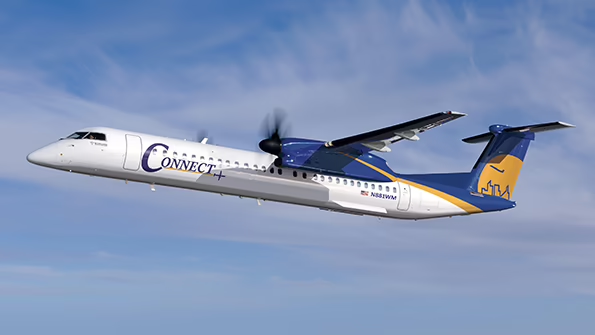Opinion: Is It Time For A Turboprop Resurgence?

The U.S. domestic airline market carried 926 million passengers, of which roughly 165 million—almost 20%—took flights shorter than 450 mi. (the “regional market”) in 2019. Nearly all of these flights were undertaken with less fuel-efficient regional jets (in particular, 50-seaters such as old-generation Bombardier CRJ200 and Embraer ERJ135/145 aircraft).
In the U.S. regional aircraft market, only 36 50-76-seat turboprops are currently flown, and the largest turboprop-flying carrier, Horizon Airlines, recently announced its intention to retire the aircraft type from its fleet by 2023. The combination of old and unfounded attitudes by passengers that turboprop aircraft are unsafe, plus ongoing pilot shortages, have driven most airlines to look past the turboprop as a viable part of their fleet strategy.
However, regional jets generate 17.2 billion lb. of CO2 emissions annually, and if they were entirely replaced by turboprop aircraft using existing technology, annual CO2 emissions could be reduced immediately by 6 billion lb., a 35% reduction in the regional airline segment. Using existing technology to dramatically reduce the carbon footprint on just one segment of the airliner market is the type of progress that is needed for the U.S. to reach its climate goals. Furthermore, this same turboprop segment provides us with the fastest and most realistic path to zero emissions through the use of hydrogen-powered electric engines.
The poor economics of 50-76-seat regional aircraft, coupled with the severe pilot shortage, is pushing mainline carriers to drop smaller cities entirely from their route maps. Since 2021, United Airlines alone has announced termination of services to at least 36 cities, mostly those under the Essential Air Service program. Other major U.S. airlines have reacted similarly, and despite pleas to other airlines from the U.S. Transportation Department to fill the void, none has so far stepped up to serve.
The time has thus come for the U.S. airline industry to rediscover the venerable turboprop as a critical part of its response to climate change and a viable means of restoring Essential Air Service to cities that are being cut off from the world. Given the significant fuel savings of turboprops over regional jets, many routes that are uneconomical for regional jets become viable with turboprops, thus enabling the major carriers to maintain service to smaller markets.
Through its new Connect Airlines brand, Waltzing Matilda Aviation (WMA) plans to introduce more fuel-efficient De Havilland Aircraft of Canada Dash 8 Q400 turboprop aircraft to replace the inefficient, high-emission regional jets that major carriers are retiring. The fuel-efficiency difference alone is 40%. In addition, WMA has partnered with Universal Hydrogen, which is developing a hydrogen-fueled, zero-carbon-emission, electric-powered system for these turboprop aircraft. Universal Hydrogen’s testbed aircraft will commence flying by the end of 2022, and certification is scheduled to be complete by 2025. WMA’s letter of intent with Universal Hydrogen secures the rights to the first 24 conversion kits for the U.S. market, making WMA and Connect Airlines the first zero-emission Part 121 airline in the U.S.
WMA started its conversion from Part 135 air taxi to a scheduled Part 121 air carrier in early 2021 and has now completed all but the final step of the FAA’s exhaustive and comprehensive Part 121 air carrier certification process. That final step, proving runs, is dependent on the U.S. Transportation Department issuing to WMA an order to show cause for a certificate of public convenience and necessity, a critical license for which WMA filed its application more than one year ago. Having met all of the Transportation Department’s requirements and undergone an extensive public Q&A period—which by all appearance ended in mid-March—prior applications and reasonable expectation would suggest that a show cause order should have been issued by March 31. Yet here we are in mid-April and still no show cause order.
If granted the necessary authorizations, Connect Airlines is willing and able to step up to restore service to many of those cities that have lost out in the recently announced reductions. With such clear benefits, it begs the question: Why is the Transportation Department delaying the approval of an airline specifically formed to reduce carbon emissions and serve the underserviced? The Transportation Department has an opportunity to restore air service to the smaller communities and create good-paying jobs, all while reducing the U.S. aviation industry’s carbon footprint. It is time to bring back meaningful turboprop flying in the U.S. by approving the new air carrier application of WMA’s Connect Airlines.
David Marcontell is chief operating officer of Waltzing Matilda Aviation, with a long career in the commercial airline industry as a senior leader and consultant. Airlines for America awarded him a Nuts & Bolts Award in 2018.
The views expressed are not necessarily those of Aviation Week.
